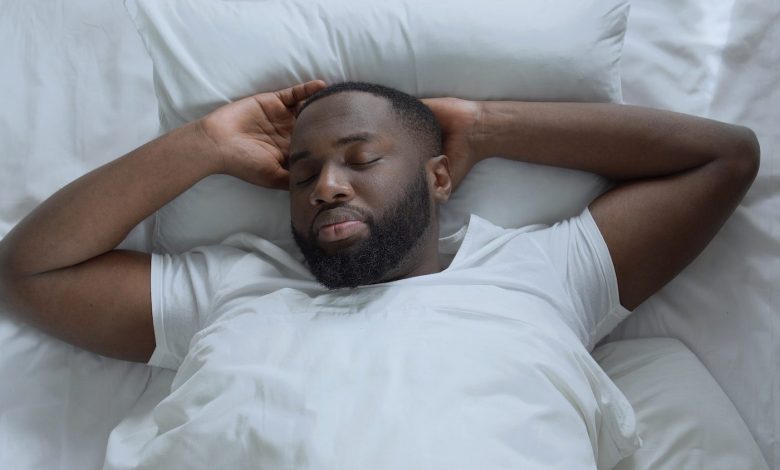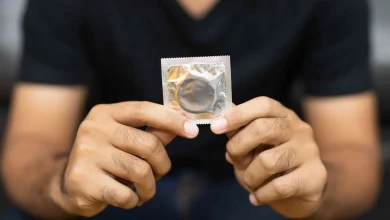
There are many unanswered questions in life, but “Why do I sweat in my sleep?” shouldn’t be one of them. A night spent tossing and turning, waking up to damp sheets, pajamas that stick to you—all signs you might be a hot sleeper. But why? There are a lot of factors that could be at play here, according to experts. If you are waking up early because of your night sweats, it might be a cause that’s easy to fix, like too-warm pajamas. But if you’re experiencing hot flashes at night regardless of what you wear to bed, it could be time to talk to your doctor.
“When you sweat while you’re sleeping, your body is losing water while it should actually be in a state to conserve fluids, since you don’t have any fluid intake at night,” explains sleep scientist Roy Raymann, PhD, chief scientific officer at SleepScore Labs. “While some minimal perspiration is normal at night, sweating that can be easily noticed or even wake you up from sleep might need some special attention.” You may have sleep hyperhidrosis—excessive night sweating, in medical terms.
Although it may seem easy to dismiss a few pit stains here and there, Michael Breus, PhD, a sleep specialist and author of Good Night: The Sleep Doctor’s 4-Week Program to Better Sleep and Better Health, says that cold sweats while sleeping is nothing to joke around with.
“Night sweats can also be signs of other medical issues, including infection, adrenal dysfunction, and cancer,” Breus says. “With such a broad range of possible causes for night sweating, it’s important to speak with your physician if you observe any changes to the typical ways your body sweats at night—if you begin to sweat more frequently, or if your sweating increases in intensity.”
ADVERTISEMENT
While “why do I sweat so much in my sleep” may not be the sexiest Google search, there are solutions available. Not only is there advice at your fingertips with the help of sleep apps that track your cycle, but there are also common mistakes to avoid to ensure a good night’s rest.
Below, we asked the experts to answer some common questions about what causes night sweats and how to solve them. You’ll never have to ask yourself “Why do I sweat in my sleep?” again.
Is it healthy to sweat while sleeping?
If your night sweats are infrequent, don’t sweat it. (Pun intended.) “It’s normal to occasionally sweat while sleeping,” says Shelby Harris, PsyD, director of sleep health at Sleepopolis. However, she says, frequent night sweats that wake you up in the middle of the night can be a sign of other medical conditions.
When should I be worried about night sweats?
According to Dr. Harris, your night sweats might be a red flag if they’re accompanied by other symptoms like a high fever or weight loss or routinely interfering with your sleep three or more nights a week. If so, she advises talking to your doctor or a sleep specialist.
Can dehydration cause night sweats?
Not necessarily. “Sweating is a completely natural function of your body,” says Dr. Harris. “Your body constantly works to make sure your core temperature doesn’t exceed approximately 98° Fahrenheit. Hydration is extremely important for maintaining your body temperature, and it may affect the intensity of your night sweats. If you’re dehydrated before you go to bed, you’ll most likely sweat less but you will feel overheated. However, if you’re well-hydrated, you will likely sweat more as your body tries to cool down.”
So why do I sweat so much in my sleep, even if I’m in a cold room?
“Bedding and sleepwear are the most common reasons people sweat in their sleep,” says Dr. Harris. “Even if the bedroom temperature is cold, sleeping in materials that aren’t breathable and don’t promote airflow can cause overheating and night sweats.”
WATCH
Women Sizes 0 Through 28 on Gym Intimidation
ADVERTISEMENT
However, there are other things that can lead to you waking up drenched in sweat. Dr. Harris says perimenopause and menopause are huge causes of night sweats for women. “Taking medications such as antidepressants, aspirin, or acetaminophen can also cause someone to sweat during sleep,” she adds. “Stress and anxiety are also common causes of excessive sweating at night. Nightmares, night terrors, and sleep apnea can activate the body’s stress response as well.” Underlying health issues—like hyperthyroidism, heart disease, diabetes, idiopathic hyperhidrosis, or infections—can also lead to night sweats.
Here’s some of the most common night sweat causes—and what to do about them.
It’s your pajamas.
The first thing to do is check your pj’s, says Breus. Are they made of polyester, a fabric that can contain body heat? What about socks? They can trap extra body heat and are one of the most common causes of night sweats.
What to do about it: Take your socks off and switch to a lighter, more breathable fabric like cotton. (Or if you’re up for it, try sleeping in the nude.) Breus recommends Cool-jams moisture-wicking pajamas. “I use them when I travel, when it’s less easy to monitor the temperature in a hotel room,” he says. “They work well.” Other companies have also created sleepwear for night sweats.
Your room is too warm.
This may be stating the obvious, but your bedroom should feel comfortably cool. “The optimal bedroom temperature is around 65° Fahrenheit,” Dr. Raymann advises. Checking your surroundings first is the easiest way to determine what is and isn’t working for you so you can know when to be concerned about night sweats.
What to do about it: The solution here is straightforward: Lower the temperature in your room. About 30 minutes before you go to bed, crank the thermometer down to 65. If that’s still not enough, add some air flow. “A box fan or an overhead fan is definitely helpful to get a cooler breeze going over the body,” Breus says. Bedroom humidifiers that emit cool air are another option to consider.
Your bedding or mattress aren’t a fit.
It’s very likely you and your partner have different sleep needs, Dr. Raymann says. If you’re sweating, it might be because the comforter or mattress that keeps your partner perfectly comfortable is too insulated for you.
What to do about it: If it’s just you in bed, the fix is simple: Get a mattress and sheet set with low insulation. If you share with a partner who runs cold, look for a dual-zone comforter that has different levels of insulation on each side. Breus also recommends trying products like ChiliPad, a pad that goes under your sheet and can be set to cool or warm.
You hit the gym too close to bedtime.
Regular exercise is great for sleep but not if you do it too close to bedtime. “During exercise, your body warms up,” Dr. Raymann says. “For sleep, your body needs to get rid of that extra heat.”
Most Popular
HOLLYWOOD, CALIFORNIA – MARCH 12: Rihanna attends the 95th Annual Academy Awards at Hollywood & Highland on March 12, 2023 in Hollywood, California. (Photo by Emma McIntyre/Getty Images)
Celebrity Style
Rihanna Wore a $1.8 Million Belly Chain to Beyoncé’s Oscars After-Party
By Elizabeth Logan
headshot of hailey bieber with middle part and tousled waves
Celebrity Style
Hailey Bieber Looks Like a Hot Fish in Her After-After Party Dress
By Elizabeth Logan
Avril Lavigne
Entertainment
Avril Lavigne Confronted a Topless Protestor at the Juno Awards
By Elizabeth Logan
ADVERTISEMENT
What to do about it: Schedule your workouts for the morning or afternoon hours, if your schedule allows. If you are going to do an evening exercise class, opt for something gentle like yoga that won’t raise your core temperature as much.
You had a late-night meal.
Those nachos may look good, but they can also cause night sweats—spicy meals can trigger a sweat response, Dr. Raymann says.
What to do about it: Don’t eat a full meal so close to bedtime. Ideally, experts say, you should eat at least three hours before hitting the hay (though not if that means you’re skipping meals). This will also help ensure an upset stomach or indigestion isn’t keeping you up at night. Whatever you do, save your spicy-food kick for lunch if you want to prevent sweating in your sleep.
You’re under a ton of stress.
If you’re experiencing a lot of stress and anxiety, it may cause sweating at night that makes your sleep uncomfortable, Breus says. Along with highly intense situations, anxiety and other similar mood disorders can disrupt both your sweat cycle and your sleep cycle. “High levels of stress can escalate heart rate and breathing, which can lead to an increase in your body temperature and cause you to sweat during the night,” adds Dr. Harris.
What to do about it: Prioritize your mental health and set up a calming nighttime routine, like journaling, reading, or doing sleep meditations before bed so you’re in a heightened state of relaxation before closing your eyes at night. Soothing sleep music may also help.
Your medication is causing side effects.
Aside from lifestyle choices, some medications can cause night sweats, Dr. Raymann says. Common culprits are steroids, some antidepressants, aspirin, and hormone therapy medication.
What to do about it: If you notice night sweats happening after you’ve started a new medication, consult with your doctor to get their advice about an alternative option.
You have an infection.
What causes night sweats? Having an illness, Dr. Raymann says. If you’re sick, that could cause you to wake up early feeling cold and clammy. “A sign of infection is fever,” he explains. “The body will still try to maintain a healthy temperature, and hence sweating will occur.”
What to do about it: Again, talk to your doctor on this one. It could just be a run-of-the-mill cold, or it could be something more serious. Especially since the outbreak of COVID-19, if you have a fever, you should get screened.
You’re going through perimenopause, menopause, or have a hormone imbalance.
Disruptions to your hormone system, both experts say, will affect your internal body temperature. Menopause can cause both hot flashes and night sweats.
What to do about it: Tweaks to your routine, like lowering the room temperature or trying moisture-wicking pajamas, may help. But with medical issues, remember it’s always important to talk to your doctor.
You have sleep apnea.
“During sleep apnea, breathing is restricted or obstructed, and because of the lack of oxygen and arousal involved, sweating can be triggered,” Dr. Raymann says.
Most Popular
HOLLYWOOD, CALIFORNIA – MARCH 12: Rihanna attends the 95th Annual Academy Awards at Hollywood & Highland on March 12, 2023 in Hollywood, California. (Photo by Emma McIntyre/Getty Images)
Celebrity Style
Rihanna Wore a $1.8 Million Belly Chain to Beyoncé’s Oscars After-Party
By Elizabeth Logan
headshot of hailey bieber with middle part and tousled waves
Celebrity Style
Hailey Bieber Looks Like a Hot Fish in Her After-After Party Dress
By Elizabeth Logan
Avril Lavigne
Entertainment
Avril Lavigne Confronted a Topless Protestor at the Juno Awards
By Elizabeth Logan
What to do about it: How to stop sweating in sleep mode? Go to your doctor on this one. Obstructive sleep apnea can be serious. So again, if you’re having trouble sleeping, talk to a medical expert so you can get to the bottom of what’s really going on.
You have a heart problem.
“Sweating, particularly at night, can be a sign of a heart problem or condition,” says Dr. Harris. “It’s often accompanied by other symptoms such as chest pain or a rapid heart rate. People who suffer from chest pain may experience cold sweats, which can happen when awake or sleeping.”
What to do about it: Are your night sweats accompanied by other symptoms like chest pain or a rapid heart rate? Are you also experiencing cold sweats during the day? If so, talk to your doctor immediately. If not, it’s likely another factor at play.
What vitamins help night sweats?
There’s not enough research to suggest that vitamins can help with night sweats, according to Dr. Harris. She advises speaking with your doctor if night sweats are routinely interfering with your sleep before starting any vitamins or supplements.
How can I stop sweating in my sleep?
To best know how to stop your night sweats, find out what’s causing them. However, Dr. Harris suggests starting with a cooler sleeping environment. “While sleeping in a warm room may not be the direct cause of your night sweats, it can definitely be a trigger or worsen them,” she explains. “Keeping your room cool, ideally between 60° and 69° Fahrenheit, while sleeping can prevent heat from building up around your body and triggering night sweats.”
In addition to adjusting the thermostat, consider a quality cooling mattress or mattress topper. Also make sure to wear lightweight, breathable, and loose-fitting clothes while sleeping to avoid sweating around the neck and chest at night. Look for pajamas in natural fabrics like cotton or linen or fabrics that are temperature regulating. The latter “can adjust their temperature to remain cool, even as your body temperature changes,” says Dr. Harris. “Plant-derived viscoses like bamboo, Tencel, and modal are all great options for temperature regulation.”
Lastly, Dr. Harris suggests trying to wind down at least 30 to 60 minutes before bed. “This can help you feel more relaxed and calm, reduce stress or anxiety, and promote quality sleep,” she says.
Anna Moeslein is the deputy editor at Glamour.



